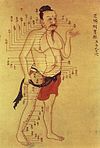David Irving
| David Irving | |
|---|---|
| Irving em 2012 | |
| Nome completo | David John Cawdell Irving |
| Conhecido(a) por | Negacionismo do holocausto, revisionismo histórico e publicações sobre a II Guerra Mundial |
| Nascimento | 24 de março de 1938 (86 anos) Hutton, Essex, Inglaterra |
| Residência | Londres, Inglaterra |
David John Cawdell Irving (nascido em 24 de Março de 1938) é um inglês negador do Holocausto[1] e escritor sobre história militar e política da II Guerra Mundial, com foco na Alemanha Nazista. Seus livros incluem The destruction of Dresden (1963), Hitler's War (1977), Churchill's War (1987) e Goebbels: Mastermind of the Third Reich (1996). Em suas obras ele argumentou que Hitler não sabia do extermínio de Judeus ou, se soubesse, seria contrário.[2] Embora a visão revisionista de Irving sobre a II Guerra Mundial nunca tenha sido levada a sério pelos historiadores, ele foi reconhecido por seu conhecimento da Alemanha Nazista e pela sua capacidade de descobrir novos documentos históricos.
Irving marginalizou-se em 1988. Com base na sua leitura do pseudocientífico[3] relatório Leuchter, ele começou a abraçar a negação do Holocausto, negando especificamente que os judeus foram assassinados em câmaras de gás no campo de extermínio de Auschwitz.[4][5]
A reputação de Irving como historiador foi desacreditada[6] quando, ao longo de uma ação de difamação movida por ele contra a historiadora estadunidense Deborah Lipstadt e a editora Penguin Books, foi mostrado que ele deliberadamente deturpou as evidências históricas para promover a negação do Holocausto. O tribunal inglês considerou que Irving foi um ativo negador do Holocausto, antissemita e racista,[7] que "por suas próprias razões ideológicas, persistente e deliberadamente deturpou e manipulou as evidências históricas".[8] Além disso, o tribunal considerou que os livros de Irving distorceram a história sobre o papel de Adolf Hitler no Holocausto para retratar Hitler de forma favorável.
Ver também[editar | editar código-fonte]
Referências
- ↑ Hare, Ivan; Weinstein, James (2010). Extreme Speech and Democracy. [S.l.]: Oxford University Press. p. 553. ISBN 0199601798
- ↑ Evans 2001, p. 101.
- ↑
- "Leuchter and Rudolf have published pseudoscientific reports purporting to show that chemical residues present in the gas chambers of Auschwitz-Birkenau are incompatible with homicidal gassings." Green, Richard J. "Leuchter, Rudolf, and the Iron Blues" Arquivado em 17 de maio de 2008, no Wayback Machine.. Retrieved 11 September 2008.
- "The Leuchter Report, a pseudo-scientific document which allegedly proves that Zyklon B was not used to exterminate human beings, was translated into Arabic and sold at the International Book Fair in Cairo in January 2001." Roth, Stephen. Stephen Roth Institute. Antisemitism Worldwide, 2000/1, University of Nebraska Press, 2002, p. 228.
- "The turning point came in 1989, when Irving launched Fred Leuchter's pseudo-scientific Leuchter Report, which made the spurious claim that the absence of cyanide residues in the walls of the gas chambers at Auschwitz and other camps proved that they could not have functioned as mass extermination centres." Brinks, Jan Herman. Timms, Edward. Rock, Stella. Nationalist Myths and Modern Media, I.B. Tauris, 2006, p. 72.
- "The Leuchter report, was, indeed, an amateurish report produced by a man with no expertise, either historical or forensic." Hirsh, David. Law Against Genocide. Routledge Cavendish, 2003, p. 134.
- "Another common tactic of the deniers is to engage in historical inquiries that on the surface appear legitimate but upon close examination prove to be based on pseudo-science. One prominent example was the investigation of the Auschwitz gas chambers by Fred Leuchter [...] Detailed study of the "Leuchter Report" revealed that it was based on erroneous assumptions (cyanide does not penetrate deeply into concrete). It also emerged that Leuchter had falsified his credentials and overstated his expertise. Despite this, his report is still cited by deniers." Cull, Nicholas John. Culbert, David Holbrook. Welch, David. Propaganda and Mass Persuasion: A Historical Encyclopedia, 1500 to the Present, ABC-CLIO, 2003, p. 168.
- "... the institute relied primary on the talents of a California-based publicist named Bradley Smith who packaged and promoted Leuchter's discredited material as if it were the very essence of "scientific research" or at least a tenable "point of view," intrinsically worthy of inclusion in the academic agenda..." Churchill, Ward. A Little Matter of Genocide: Holocaust and Denial in the Americas, 1492 to the Present. City Lights Books, 1997, p. 24.
- "After the trial, both Irving and Zündel published the results of Leuchter's trial research as The Leuchter Report: The End of a Myth, despite the fact that the court rejected both the report and Leuchter's testimony. [...] The discredited report is popular in the Holocaust denial movement, and one edition features a foreword by Irving." Gerstenfeld, Phyllis B. Grant, Diana R. Crimes of Hate: Selected Readings, SAGE Publications, 2003, p. 201.
- "Leuchter's report contained a considerable amount of scientific, or, as it turned out, pseudo-scientific analysis of chemical residues on the gas chamber walls, and similar matters. It was quickly discredited, not least on the basis of Leuchter's failure adequately to defend his findings on the witness stand." Evans, Richard J. David Irving, Hitler and Holocaust Denial: Electronic Edition, Section 3.3c, The 1991 Edition of Hitler's War, Paragraph 13. Retrieved 2008-09-12.
- ↑ Jan van Pelt, Robert (2002). The Case for Auschwitz:Evidence from the Irving Trial First ed. Bloomington, Indiana: Indiana University Press. p. 15. ISBN 0-253-34016-0
- ↑ Evans 2001, p. 125.
- ↑ «The ruling against David Irving». The Guardian. London. 11 de abril de 2000. Consultado em 27 de março de 2010
- ↑ «Hitler historian loses libel case». BBC News. 11 de abril de 2000. Consultado em 2 de janeiro de 2010
Bibliografia[editar | editar código-fonte]
- Evans, Richard J. (2001). Lying About Hitler: History, Holocaust, and the David Irving Trial. New York: Basic Books. ISBN 0-465-02152-2
- An Interview with David Irving Confronting Hitler's Defender
Ligações externas[editar | editar código-fonte]
- Sítio oficial
- David Irving. no IMDb.
- Irving (personagem)/ David Irving (em inglês) no IMDb





